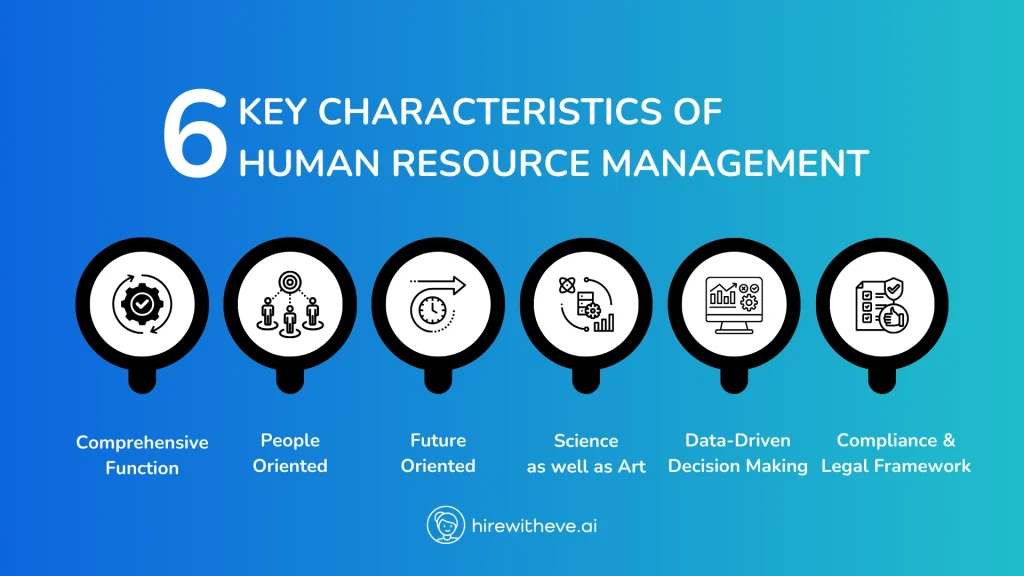6 Important Characteristics of Human Resource Management

Human resource management (HRM) is at the core of every organization, influencing everything from hiring practices to employee development and retention. Talent acquisition specialists and HR managers play a critical role in shaping how businesses operate by managing the organization’s most valuable asset — its people. But what exactly defines the characteristics of human resource management?
In this blog, we will explore the essential aspects of HRM, how they drive success in organizations, and what recent surveys and insights reveal about evolving HR practices.
Understanding the characteristics of human resource management is essential for creating policies and practices that align with business goals. Whether you’re managing recruitment, training, performance, or employee engagement, each function of HR reflects its unique characteristics.
Let’s dive into the definition and explore how these characteristics shape modern HRM.
Defining the Characteristics of Human Resource Management
The characteristics of human resource management are the foundational principles that dictate how HR functions are executed. These characteristics include strategic alignment, adaptability, and employee-centricity. Essentially, HRM is not just about managing employees but doing so in a way that aligns with the overall strategy and culture of the organization.
One of the core characteristics of human resource management is its strategic approach. HR is no longer viewed as merely an administrative function but as a strategic partner in achieving organizational goals. Whether it’s through skills-based hiring, diversity initiatives, or employee development programs, HRM contributes to long-term success by ensuring the right people are in the right roles.
Another key aspect of HRM is flexibility and adaptability. The modern workforce is constantly evolving, and so are the strategies HR professionals use to manage it. From leveraging technology to improve talent acquisition processes to adapting policies for remote work, adaptability is a hallmark of effective HRM.
Lastly, employee-centricity stands out as a characteristic of human resource management that cannot be overlooked. HRM focuses on employee engagement, satisfaction, and development. This involves understanding employee needs, ensuring a positive work environment, and facilitating continuous learning opportunities.
Survey Insights on Human Resource Management Practices
Recent surveys conducted by global HR leaders have highlighted trends in how the characteristics of human resource management are evolving. One study from Deloitte found that 84% of organizations believe HR must be involved in organizational strategy, reflecting the strategic importance of HRM.
Another survey by Gartner revealed that 63% of companies are actively investing in technologies that support remote and flexible work, showcasing adaptability as a critical HR function.
The characteristics of human resource management in top-performing organizations are also deeply tied to employee experience. According to a survey from McKinsey, organizations that prioritize employee engagement see up to 21% higher profitability. This speaks to the importance of HR practices that focus on employee-centricity, including well-being programs, development initiatives, and inclusive cultures.
These surveys illustrate how vital the characteristics of human resource management are for driving success. As HRM continues to evolve, so do the expectations from HR leaders to strategically influence business outcomes while maintaining flexibility and focusing on employee well-being.
6 Key Characteristics of Human Resource Management
Here we will break down some of the most critical characteristics of human resource management and how they impact HR practices today:

Comprehensive Function
One of the core characteristics of human resource management is its comprehensive nature. HRM encompasses a wide range of responsibilities, from recruitment and employee development to performance management and compensation. By managing these diverse functions, HR ensures that every aspect of employee life is handled efficiently, supporting overall business objectives. This comprehensive approach allows organizations to address multiple HR needs simultaneously, leading to more cohesive and integrated management strategies.
People-Oriented
Human resource management is inherently people-oriented. A key characteristic of HRM is its focus on understanding and addressing the needs of employees. This involves creating a positive work environment, promoting employee engagement, and ensuring job satisfaction. A people-oriented approach emphasizes the importance of building strong relationships between employees and management, fostering a culture where employees feel valued and supported. By focusing on people, HR professionals can drive higher retention rates and build a more motivated workforce.
Future-Oriented
Another essential characteristic of human resource management is its future-oriented perspective. HRM doesn’t just address the present needs of the organization but also prepares for future challenges. This forward-thinking approach involves anticipating workforce trends, understanding shifts in the labor market, and proactively planning for changes such as technological advancements and evolving employee expectations. Future-oriented HRM ensures that organizations remain competitive by continually adapting to the changing needs of the workforce and the business environment.
Science as well as Art
HRM is often described as both a science and an art. On the scientific side, HR relies on data, analytics, and structured processes to make informed decisions regarding recruitment, performance evaluations, and employee development. However, the art of HRM involves the nuanced management of interpersonal relationships, communication, and conflict resolution. Striking a balance between the science and art of HR allows organizations to implement structured, data-driven processes while fostering creativity, emotional intelligence, and adaptability in managing people.
Data-Driven Decision Making
Modern HRM is heavily influenced by data. One of the defining characteristics of human resource management today is its reliance on data-driven decision-making. By leveraging data analytics, HR professionals can track performance metrics, predict workforce trends, and make informed decisions regarding hiring, training, and employee retention. Data-driven HR practices enable organizations to identify potential challenges and opportunities, providing a more accurate picture of employee performance and overall workforce health.
Compliance and Legal Framework
Compliance with legal regulations is a crucial characteristic of human resource management. HR departments are responsible for ensuring that the organization adheres to labor laws, workplace safety standards, and anti-discrimination policies. This characteristic safeguards both the organization and its employees from potential legal risks, ensuring a safe and fair workplace. HR professionals must stay updated on changing regulations and ensure that all practices, from hiring to termination, comply with legal standards.
Conclusion
The characteristics of human resource management are vital in shaping how organizations attract, retain, and develop talent. HR professionals can play a pivotal role in driving organizational success by focusing on strategic alignment, adaptability, employee engagement, and continuous improvement.
As we move into a future of hybrid work environments and digital transformation, understanding these characteristics becomes increasingly important for HR managers and talent acquisition specialists.
HirewithEve, with its tools tailored for skills-based hiring and data-driven decision-making, can help HR teams align with these characteristics. For example, the platform’s integration with ATS systems and its support for remote hiring aligns perfectly with the strategic and adaptable characteristics of human resource management.
